-
On Stage with Kevin KlingFrom"21A"
CHAIRMAN FRANCIS: Our church is the street, our faith is the people, and our laws are constantly changing. If a law offends us, we pluck it out. If a minister offends us, we pluck him out and elect a new minister who is young and strong and can recognize evil’s ever-changing face. We don’t believe in miracles, we believe in action. But action takes money. Mr. Chairman, the church of Democratic Progression needs your financial support. Now, Mr. Chairman, how much would you pay to nip evil in the bud? Now I’m not talking about wiping out evil entirely, just your own little personal dark speck. Would you pay forty dollars, Mr. Chairman? Thirty dollars? Twenty dollars, the price of four filthy movies? NO. Mr. Chairman, for just fifteen dollars a month you can keep a chairman, like myself, on the streets fighting evil on your behalf.
 21A (kli21A)Premiered in1986
21A (kli21A)Premiered in1986- Print Books
- Powell's
- Barnes & Noble
- Alibris
- Abe Books
- Minnesota Historical Society
- E-Books
- Kobo
- Barnes & Noble
-
On Stage with Kevin KlingFrom"21A"
RON HUBER: Lady. What’s this doing here?
CASHIER: What? That’s cream.
RON HUBER: Yeah, well where’s the Coffee Mate?
CASHIER: We ran out so we had to use real cream.
RON HUBER: Christ. First the cinnamon triangles and now this. This place is going to hell. What? What, am I supposed to put that liquid shit in perfectly good coffee?
CASHIER: Look, cream is better that powder. It’s more healthy for you.
ROB HUBER: You think I come to SA for my health. Now you march to the back and get me some Coffee Mate, young lady. I got a bus waiting.
 21A (kli21A)Premiered in1986
21A (kli21A)Premiered in1986- Print Books
- Powell's
- Barnes & Noble
- Alibris
- Abe Books
- Minnesota Historical Society
- E-Books
- Kobo
- Barnes & Noble
-
On Stage with Kevin KlingFrom"21A"
STEVE: So, this morning we were at the doctor’s office and Steve wanted to show how smart he was ‘cause he knows they’re thinking about locking us up. So, he starts going through the K-Marts beginning with “A”. Well, I read this morning in the paper they’re opening a new K-Mart in Burnsville. I’m sitting there nice and quiet and polite the whole time he and the doctor are talking and then Steve starts reciting and gets to the “B’s” and ooops – he missed Burnsville. So, I calmly say, “Burnsville.” ‘Cause I didn’t want Steve to look bad in front of the doctor. I was only trying to help and Steve said, “What?” And I said, “Burnsville, Steve.” And he said, “What about it?” And I said, “There’s a K-Mart in Burnsville.” Steve goes “Huh uh” and I go “Uh huh” and Steve goes “Huh uh” and I go “Uh huh, I just read it in the paper today.” And then Steve really lost his cool…
 21A (kli21A)Premiered in1986
21A (kli21A)Premiered in1986- Print Books
- Powell's
- Barnes & Noble
- Alibris
- Abe Books
- Minnesota Historical Society
- E-Books
- Kobo
- Barnes & Noble
-
The Magic of BloodStoriesFrom"Recipe"
You will begin to listen to the story of Josie’s life in Spanish and English. You will begin to like the way she looks. At moments you will confuse her with the stripper dancing naked on the table next to where the two of you talk. Josie will be telling you about her marriage, about her husband, about her divorce, about her daughter, about her sadness and disappointment. You will have more drinks than her.
“Recipe” from THE MAGIC OF BLOOD by Dagoberto Gilb © 1993 by the University of New Mexico Press; reprinted with the permission of the publisher, Grove Atlantic, Inc. “Recipe” originally appeared in Winners on the Pass Line (Cinco Puntos Press).
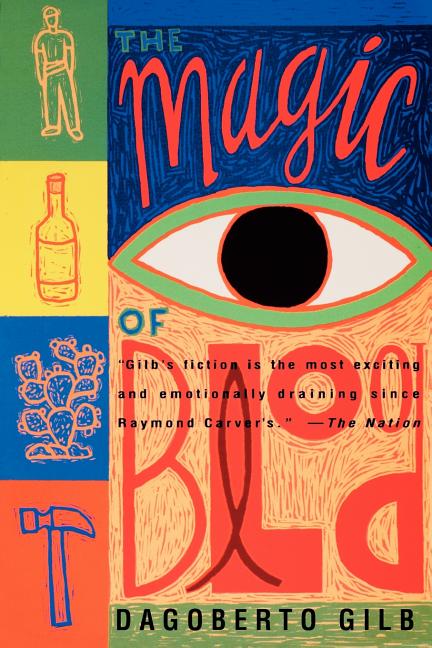 The Magic of Blood : Stories
The Magic of Blood : Stories -
The Magic of BloodStoriesFrom"The Desperado"
His adrenalin shook the bed. The boy stirred. Tucker patted his son’s back, praying the boy wouldn’t wake up, not yet. He wanted to know where the fuck she was. He wished he hadn’t slapped her. He wished the boy hadn’t seen him slap her. He remembered how quiet the boy was when they were fighting. He remembered that he didn’t cry then. The boy was back asleep. Tucker decided he too could use some winks. He tried to sleep, and after a while he did.
“The Desperado” from THE MAGIC OF BLOOD by Dagoberto Gilb © 1993 by the University of New Mexico Press; reprinted with the permission of the publisher, Grove Atlantic, Inc. “The Desperado” originally appeared in The Sonora Review.
 The Magic of Blood : Stories
The Magic of Blood : Stories -
The Magic of BloodStoriesFrom"Ballad"
He tried to ignore that snake, and he’d moved a chair around the room so he wouldn’t notice it. He moved the television. None of it did any good. He ate TV dinners with it above him. His whole childhood it was coiled above him. Once he stared into its jaws and let himself enter. It was dark and frightening, but then that went away, just as time did. Just as time did watching a movie on the television. Good guys, bad guys, guns, horses, right, wrong. The West.
“Ballad” from THE MAGIC OF BLOOD by Dagoberto Gilb © 1993 by the University of New Mexico Press; reprinted with the permission of the publisher, Grove Atlantic, Inc. “Ballad” originally appeared in The Threepenny Review.
 The Magic of Blood : Stories
The Magic of Blood : Stories
Selected Works
read more >-
Heaven-And-Earth HousePoemsFrom"Heaven-and-Earth House"
We are the nothing-to-lose ones,
the try-anything-once ones,
weed seeds inside our cells –
dandelion, nettle, lizard tail –
roots sunk in, for it is the tips
that count, reaching out to tap
new moisture. Roots, stems, leaves,
the stomata, those little mouths
opening, closing, sucking in air
in the evening when we boil
wild ginger and sleep in its vapor.
Like cures like, we hear in the morning
when we brush ourselves with
vegetable fiber in the shower,
beat ourselves with our fists.
(This is no crazier than anything else.)
 Heaven-And-Earth House : Poems
Heaven-And-Earth House : Poems -
Heaven-And-Earth HousePoemsFrom"Jackpot"
I bet on the reptiles, on the scaly-skinned,
the spadefoot toad who burrows backward
and sleeps seven feet down in the sand.
I go with the insects who breed and feed at night,
with the single-celled protozoan protected
from the heat by is own cyst.
I bet on the woman on the couch with
a growth on her cheek, the seven-year-old
in cowboy boots with eczema head to toe.
I roll for the shay hand, spastic muscle, drooling lip.
I roll for the palsied girl that she may walk,
the diapered man that he may no longer drip.
 Heaven-And-Earth House : Poems
Heaven-And-Earth House : Poems -
Heaven-And-Earth HousePoemsFrom"Peelings"
I lie hour after hour, staring at the lightbulb
in that lamp over the bed, then everything seems rimmed
in peelings – the intercom, the nurse’s caps, the strings
that tie this gown around my neck. I’m encased in
this room and if I could pull away the rind of this illness,
it’s been so long, I wonder what might be left underneath.
My skin. No one can understand the pain of being touched.
Or not. The problem: not even a rash to show the staff
bustling in at 6 a.m. Disappointing, I’m sure, for the interns.
 Heaven-And-Earth House : Poems
Heaven-And-Earth House : Poems
Selected Works
read more >-
Passionate MindsWomen Rewriting the WorldFrom"The Strong Woman: Mae West"
Because there were no available roles for a woman who drove men wild and enjoyed them in bed by the dozen and gave as good as she got and didn’t want to marry and never suffered for any of it, Mae West had to become a writer before she could be a movie star. She began her literary career with a sketch for a vaudeville act in 1913, when she was twenty and her fame still rested largely on her ability to perform a well-advertised “muscle dance in a sitting position.” By the time her first successful theatrical opus, entitled Sex, got her arrested in New York, in 1927, she’d been honing her playwriting skill alongside her nonpareil shimmy and cooch for over a decade.
 Passionate Minds : Women Rewriting the World
Passionate Minds : Women Rewriting the World -
Passionate MindsWomen Rewriting the WorldFrom"A Society of One: Zora Neale Hurston"
Hurston was at the height of her powers when, in 1937, she first fell seriously out of step with the times. She had written a love story—“Their Eyes Were Watching God”—and become a counterrevolutionary. Against the tide of racial anger, she wrote about sex and talk and work and music and life’s unpoisoned pleasures, suggesting that these things existed even for people of color, even in America; and she was judged superficial—by implication, merely feminine. In Wright’s account, her novel contained “no theme, no message, no thought.” By depicting a Southern small-town world in which blacks kept mostly to themselves, enjoyed their own rich cultural traditions, and were able to assume responsibility for their own lives, Hurston appeared a blithely reassuring supporter of the status quo.
 Passionate Minds : Women Rewriting the World
Passionate Minds : Women Rewriting the World -
Passionate MindsWomen Rewriting the WorldFrom"Twilight of the Goddess: Ayn Rand"
At a Fountainhead anniversary banquet held by the Ayn Rand Institute, nearly two hundred people paid a hundred and twenty-five dollars each to listen to excerpts from Rand’s private letters, and to watch each other bid more than five thousand dollars for her blue-green metal ashtray and matching lighter (the last-minute addition of two cigarettes marked with a dollar sign, a famous Rand prop, doubtless drove up the price) and twenty-five thousand dollars for the manuscript of her last speech, made in 1981 to the National Committee for Monetary Reform, for which Rand herself had been paid in gold. Throughout the festivities, responsively conservative business executives, teachers, secretaries, lawyers, and a scattering of college students who’d been barely old enough to read at the time of Rand’s death discussed the principles of heroic individualism by which she had taught them all to live.
 Passionate Minds : Women Rewriting the World
Passionate Minds : Women Rewriting the World
Selected Works
read more >-
Whoredom in KimmageThe World of Irish Women
I had been in Ireland for six months, living mostly in Dublin, and I knew the unspoken rules of the Irish pub well enough to know that I was breaking most of them. I was a woman and I was alone. I was drinking stout instead of lager, a pint instead of a half pint. I was trying to pay for my own drink and, since there was no real lounge in this pub, I had no choice but to sit with the men. These were things a woman, traditionally, should not do, but I had a strong sense that in Ireland most rules had been created precisely that they might be broken…
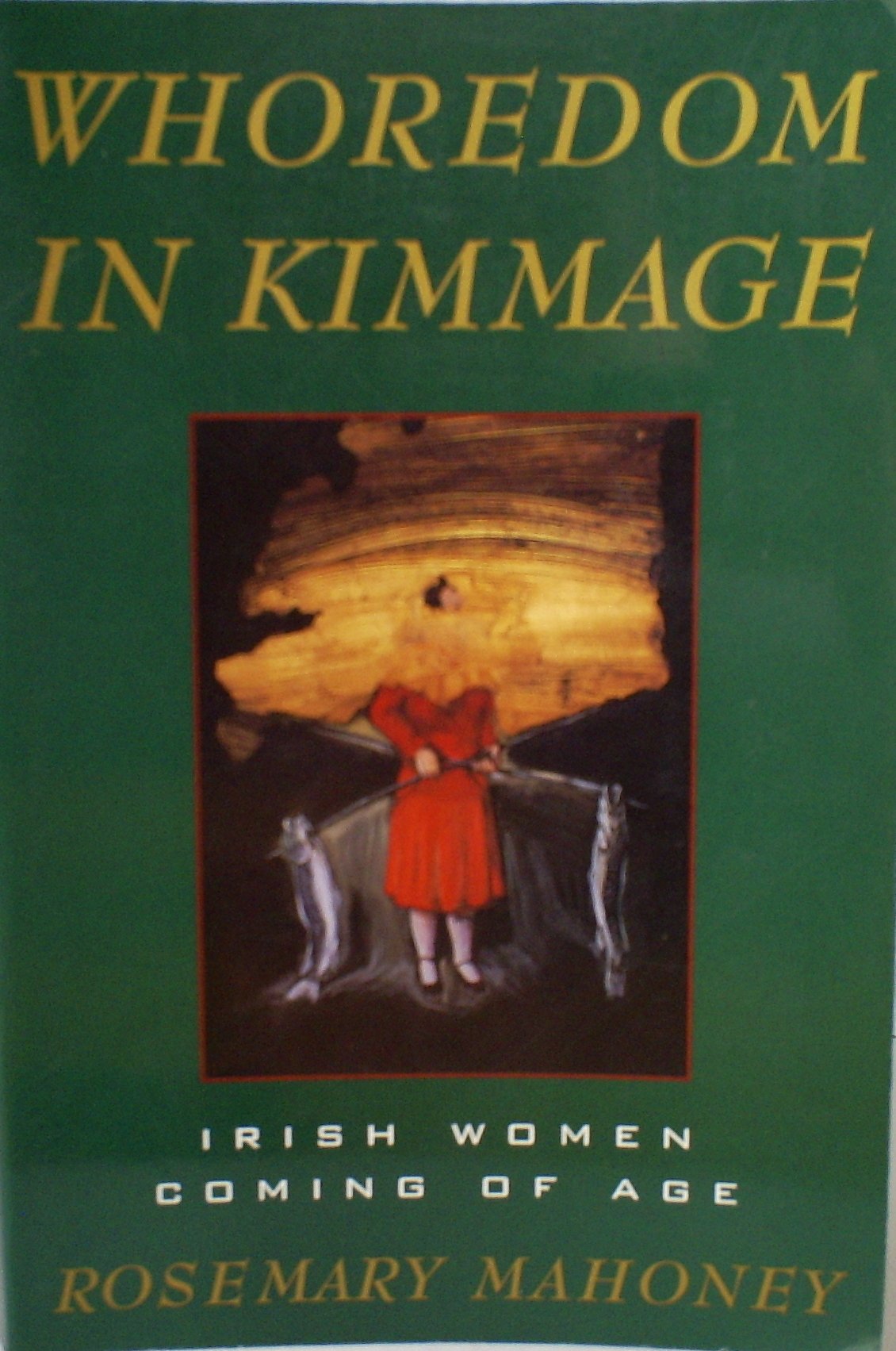 Whoredom in Kimmage : The World of Irish Women
Whoredom in Kimmage : The World of Irish Women -
Whoredom in KimmageThe World of Irish Women
Religion was as pervasive as the currency. It was everywhere. It was embedded deep in the Irish mind, and that seemed most evident in the way Irish people blessed themselves as they passed by a church; an instinctual flutter of the right hand as they studied the headlines of the newspaper they had just bought, or scolded a disobedient child, or made a conversational point to a companion. Sometimes just the fingers moved, twitching above the sternum or passing absently over the face in a barely perceptible wiping motion. Riding in a Dublin bus, I was often gripped by an eerie disorientation at the moment the bus passed by a church (a church I was never quick enough to notice), and I glimpsed, in the periphery of my vision, thirty hands flying into the air in similar fashion.
 Whoredom in Kimmage : The World of Irish Women
Whoredom in Kimmage : The World of Irish Women -
Whoredom in KimmageThe World of Irish Women
Conor was hot-faced and frowning now. Angrily he said, “Well, you son of a bitch, Mick Pat! When was the last time you had a good cleaning out? When was the last time you had a good cleaning out of your pipes, Mick Pat? You never had sex in your life, you little bastard. You’re a virgin. You are a virgin.”
Mick Pat sat still in his seat. He looked at the floor, and his heavy gray hair fell forward boyishly on his high forehead. With his smaller hand he brushed his hair back, then laid the hand gently over his mouth; but for the nicotine stains, it was the hand of an adolescent boy. “I am not,” he said. “I am not. I am not.” But he spoke unconvincingly, as though trying to persuade his own doubtful soul.
 Whoredom in Kimmage : The World of Irish Women
Whoredom in Kimmage : The World of Irish Women
Selected Works
read more >-
Let the Dead Bury Their DeadStoriesFrom"Cornsilk"
Am I sitting here amid boxes of chicken and snow-peas, beef and broccoli, gooey rice and the remnants of an eggroll dabbled in mustard and duck sauce, scribbling the thoughts of a madman? Or am I merely depraved? Are these the thoughts of a neurotic? A psychopath? Or am I just more honest than most? Smarter? Am I daring greatly? Or have I been cursed for violating a sacred trust older than Yoruba legend and Nippon lore? Am I the victim of the gods’ own jealous wrath? Eat of any tree in the garden, but you are damned if you eat of the fruit of the One Tree. Double-damned if you enjoy it. Triple-damned if you can’t get enough.
Damn.
 Let the Dead Bury Their Dead : Stories
Let the Dead Bury Their Dead : Stories -
Let the Dead Bury Their DeadStoriesFrom"Run, Mourner, Run"
The order and rhyme of what happened next ricocheted in a cacophony in Dean’s head even now: Ray blinks awake: Percy: his three sons: the sound snap-click-whurrr, snap-click-whurrr, snap-click-whurrr: dogs yapping: tugging at their leashes: Well, well, well, look-a-here, boys, salt-n-pepper: a dog growls: the boys grin and grimace: Dean jumping up, naked, to run: Get back in that bed, boy: No I—: I said, get back in that bed: snap-click-whurrr, snap-click-whurrr: a Polaroid camera, the prints sliding out like playing cards from a deck: the sound of dogs panting: claws on wooden floors: the boys mumbling under their breath: fucking queers, fucking faggots: damn, out of film.
 Let the Dead Bury Their Dead : Stories
Let the Dead Bury Their Dead : Stories -
Let the Dead Bury Their DeadStoriesFrom"Let the Dead Bury Their Dead"
…but anyway they took him and they took and named him Pharaoh, that’s where he come to get that name. See, they use to do things like that, take a slave and name him after a king—Caesar, Napoleon, something like that. Thought it was funny, some kind a joke. But this time the joke was on them. They say ole Pharaoh had some plot cooking in his head from day one. See, them Crosses ain’t know nothing bout his history of skipping off cause the man what sold him wont bout to run off at the mouth bout his always getting aloose and being so ornery. So ole Pharaoh played the good slave, Tomming it up, you know. Had him out in the field first, cause he was so big and strong and black. And from the way he worked and behaved you couldn’t a believed this had been the same man. Ah, but he was a man of powerful magic. And somehow or nother he got closer and closer to the house.
 Let the Dead Bury Their Dead : Stories
Let the Dead Bury Their Dead : Stories
Selected Works
read more >-
Familiar HeatA Novel
Faye fell to the deck in slow motion. It took forever for this part to end. “Hold still,” he warned as he cut her out of her clothes, the blade cool against her belly. “You won’t be needing these,” he said, and she knew rape wasn’t the last thing. She knew he intended to kill. That was next, when he had done with her. It meant something to him to know he was disgusting her now, hurting her, terrorizing her, it was why he did it, why he kept his eyes on her face, as he labored over her, his good arm corded and trembling, the point of the knife at her throat. She stared up past him to the square of sky framed by the hatch, waiting for it to be over, this now, waiting for the next thing, her next chance, her last chance.
 Familiar Heat : A Novel
Familiar Heat : A Novel -
Familiar HeatA Novel
The day Cristo died, his mother’s secret life ended. She used to take off her wedding ring to wash dishes, and drop it into Cristo’s baby cup on the windowsill while she worked, and when she had finished at the sink, and the counters and the stove were wiped clean, she’d smooth almond lotion onto her hands and massage it in, then slip her ring back on, always doing this, every time, except when she fled on one of her musical and sexual fugues, taking nothing but the northbound bus, no luggage, no ID, nothing pawnable, just cash in her pocket for bus and concert tickets, coffee and cigarettes and incidentals—someone else would pay for the drinks and meals and room, if it came to that, and that’s what it usually came to, and her staying gone as long as her mood and mad money held out.
 Familiar Heat : A Novel
Familiar Heat : A Novel -
Familiar HeatA Novel
That boat had been there all along, and he’d ridden past it—the bus crossed high over the marsh at that point, on the Interstate, and the view unblocked, the last gold-dusty light almost signaling in its slant, drawing his drowsy eyes to the skip-planked dock and barnacled pilings. He’d always sat on the other side of the bus, or was dozing, or talking, or getting things together for when they got to town. There the boat stood, his future, shining in the raveled fringe of the marsh, the sungold as thick as pollen, every blade of grass burnished, and the creek with that same gold in its reflected sky. The weathered wood looked gentle, gracious, elegant in its curves, in that light. He loved the boat at first sight.
 Familiar Heat : A Novel
Familiar Heat : A Novel
Selected Works
read more >-
Ornament and SilenceEssays on Women's Lives from Edith Wharton to Germaine GreerFrom"There At The New Yorker: The Novel I Never Wrote for William Shawn "
This decision to wear his coat—like other stratagems of Mr. Shawn’s, like many of the procedures at the old New Yorker—might have been viewed by outside observers as quaint. But it was simply a solution to a practical problem. He was terrified of catching cold, because that might keep him from working. It might slow what always looked in him like the semisacred task of getting out the magazine each week in a form as close to perfect as he could make it. He was also phobic about self-service elevators, especially if they were full of strangers, people with emotional demands, or people with colds. I’ve never known anyone to match him in the imagination he brought to getting around some problem—to thinking things out. Working on his proofs at the Algonquin was simply the solution to that day’s dilemma: how to do his work, when he had to leave the office early because the fellow who operated the manual elevator was going off duty at three in the afternoon. (The elevator was the only own Shawn could ride serenely, and it had been expressly retained by the building’s management after the other elevators were automated.)
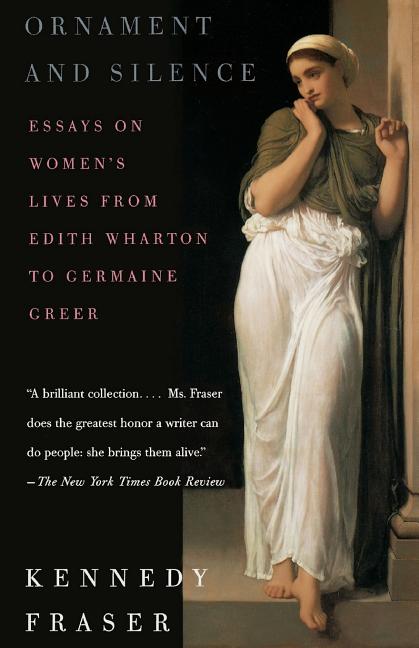 Ornament and Silence : Essays on Women's Lives from Edith Wharton to Germaine Greer
Ornament and Silence : Essays on Women's Lives from Edith Wharton to Germaine Greer -
Ornament and SilenceEssays on Women's Lives from Edith Wharton to Germaine GreerFrom"Warmed Through and Through"
Edith [Wharton] knew what she wanted. And what she wanted, with all the energy of a passionate nature that has been starved and stoppered for a lifetime, was W. Morton Fullerton, warts and all. The year she welcomed him in to the Mount, the winter was already setting in. She and Fullerton went out driving in the motor and were forced to stop when snow began to fall, so that Cook could put on the chains. The couple walked a little way into the woods, where they talked and smoked cigarettes. They broke off sprigs of witch hazel. In her and him, something stirred. He must have given off—sitting there on a deep bank in a cold New England wood—that faint and indescribable aura, just short of a scent, that even well-bred, well-bathed, and well-dressed men give off when they are in the habit of frequent and eclectic sex.
 Ornament and Silence : Essays on Women's Lives from Edith Wharton to Germaine Greer
Ornament and Silence : Essays on Women's Lives from Edith Wharton to Germaine Greer -
Ornament and SilenceEssays on Women's Lives from Edith Wharton to Germaine GreerFrom"Fritillaries and Hairy Violets"
At this point, the telephone rang. It often does when Miriam Rothschild is in residence at Ashton Wold: allies on the fronts of her various causes; friends in Jerusalem (where she interests herself in wildflower conservation, a crafts center, and the Biblical Zoo), or in Zurich or America; friends to meet in town (this week, after the Chelsea Flower Show), or over luncheon back at home in the country. This particular call was a request, for the second time in two days, that she provide a home for a fox. She has eight foxes, and some of them like to come in and watch animal programs on television with her. People are known to call her Mother Fox.
“Tell me,” she instructed the caller, firmly taking charge. “Is it tame? What age is it? Is it very nervous?”
 Ornament and Silence : Essays on Women's Lives from Edith Wharton to Germaine Greer
Ornament and Silence : Essays on Women's Lives from Edith Wharton to Germaine Greer
Selected Works
read more >-
My AlexandriaPoemsFrom"Chanteuse"
Prendergast painted the Public Garden;
remembered, even at a little distance,
the city takes on his ravishing tones.
Jots of color resolve: massed parasols
above a glimmering pond, the transit
of almost translucent swans. Brilliant bits
- jewels? slices of sugared fruit? – bloom
into a clutch of skirts on the bridge
above the summer boaters. His city’s essence:
all the hues of chintzes or makeup
or Italian ices, all the sheen artifice
is capable of. Our city’s lavish paintbox.
 My Alexandria : Poems
My Alexandria : Poems -
My AlexandriaPoemsFrom"The Wings"
An empty pair of pants
is mortality’s severest evidence.
Embroidered mottoes blend
into something elegiac but removed;
a shirt can’t be remote.
One can’t look past
the sleeves where two arms
were, where a shoulder pushed
against a seam, and someone knew exactly
how the stitches pressed against skin
that can’t be generalized but was,
irretrievably, you, or yours.
 My Alexandria : Poems
My Alexandria : Poems -
My AlexandriaPoemsFrom"Brilliance"
Maggie’s taking care of a man
who’s dying; he’s attended to everything,
said goodbye to his parents,
paid off his credit card.
She says Why don’t you just
run it up to the limit?
but he wants everything
squared away, no balance owed,
though he misses the pets
he’s already found a home for
- he can’t be around dogs or cats,
too much risk…
 My Alexandria : Poems
My Alexandria : Poems
Selected Works
read more >-
The Sex OffenderA Novel
“Do you masturbate?” he pried.
“Only alone, by myself.” I felt him bristle at my insolence.
“Do you work with appropriate fantasies?”
“Work?”
“You know, do you masturbate to appropriate fantasies before indulging in your inappropriate ones?” He’d given me very specific instructions about this. He scolded my silence by scooting his chair forward till I could smell the odor of his leg.
“Sometimes. Sometimes I forget.”
THE SEX OFFENDER © 1994 by Matthew Stadler; reprinted with the permission of the publisher, Grove Atlantic, Inc.
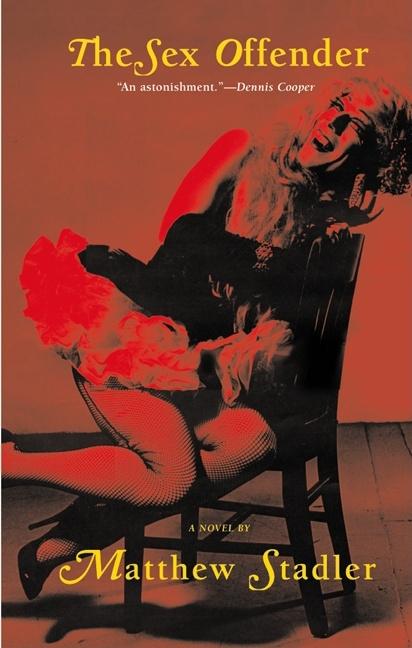 The Sex Offender : A Novel
The Sex Offender : A Novel -
The Sex OffenderA Novel
No stars pierced the sky, nor lights reflected back off the overcast. A fire burned high on the bare hillside. Its orange flame danced weakly in the frozen air, offering the occasional blackened silhouette of branches and a tiny, fluttering tricolor being carried around the flames. Was Hakan up there, I wondered, with them? Would her song be sung, again, wobbling richly through the winter air to touch my ears, and why? What standard did she bear for them, what spirit? Was the night their enemy or friend? I watched the Prime Minister wander away into that same night and could not help but love him whose demise they sought; I felt, for the first time, that they loved him too. They could not say it, and perhaps did not even recognize the embrace contained within their hatred. I wondered how much he knew of their plot against him, and whether it was an end he in some ways desired. And what did he know of me?
THE SEX OFFENDER © 1994 by Matthew Stadler; reprinted with the permission of the publisher, Grove Atlantic, Inc.
 The Sex Offender : A Novel
The Sex Offender : A Novel -
Landscape: MemoryA Novel21 June 1915, BolinasI took my drawing kit with me south along the shore, watching Duncan running off ahead, disappearing around a bend, off to Stinson Beach or Half Moon Bay or Mexico or however far his legs could carry him in two hours. I walked as far as Weeks Gulch and turned to look at the actual setting of the memory I'd been trying to paint, afraid of what I might see. There were, it appeared, some problems. The painting I'd made was markedly different from what lay before me. The beautiful hills I'd drawn were much higher and their descent to the water much sharper than what was there now. The lagoon itself—that is, the lagoon in front of me—spread out farther and into more mysterious nooks than I could find in the lagoon I had drawn. The position of the sun was impossible.All in all I found my painting a good sight more satisfying than the actual landscape. I had several choices and I faced them boldly. I chose to make excuses and go with my aesthetic impulse. My impulse was to leave my work as it was and forge ahead. My excuse was that my memory was more like a nurse log than a camera. I was remembering the trouble I'd had with Cicero. If he was right, if my memory ought to be an accurate replica of the original experience, if that was so, my painting was hopelessly inaccurate. It was a bad painting of a fuzzy memory. But I preferred to think that memory is never frozen, nor should it be. My painting was a successful rendering of the dynamic memory that had simply begun with the original event. It accurately captured the decaying grotesque of memory that lay rotting in my head, that fallen nurselog out of which so much of value must be growing. My painting, I figured, was so very accurate in its depiction of this memory that it would inevitably look wrong when compared to the original model.
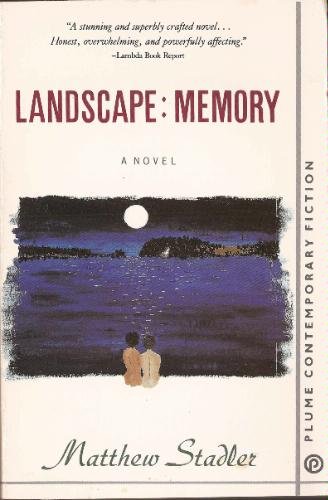 Landscape: Memory : A Novel
Landscape: Memory : A Novel